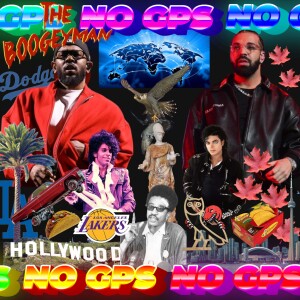
Saturday Jul 13, 2024
NO GPS | Part II-> H Rap Brown: Kendrick Lamar, Drake and (Ni**a) Authenticity | Ep21
"You run to Atlanta when you need a check balance, Let me break it down for you, this the real nigga challenge" - Kendrick Lamar
"See it's no in between: you're either free or a slave" - H. Rap Brown
In one of this podcast's favourite articles, On the Question of Nigga Authenticity, Ronald T. Judy writes:
"The nigga is constituted in the exchange of experience for affect. This is not identical with the bad nigger who jeopardized community by insisting on having unmediated free experience. Such an insistence requires an essential innocence of identity, a way of understanding experience that is simply impossible right now. A nigga forgets feelings, recognizing, instead, that affects are communicable, particularly the hard-core ones of anger, rage, intense pleasure. One can belong with millions of others in an asynchronic moment of consumption of the same affect, the same passion. This is not empathy. The possibility of the nigga rests on the twofold of experience and affect, and the fact that experience is essentially unfungible; it cannot be sold as is but must be abstracted and processed by the formulaic functions of transnational capitalism. Knowing this, the hard-core gangster rapper traffics in affect and not values. In this sense, hard-core rap is the residual of the nonproductive work of translating experience into affect—it is pulp fiction, drawing into its web all the real nigga experiences it can represent in the affective constitution of niggaz."
In the decades since its publication, global capitalism's wholesale consumption of Judy's hardcore nigga has been completed. Maybe many times over. Processed and reformed to the point it has achieved a smooth exterior. A cutting edge that glows in the dark. Caramelised product that goes down better than ever before. But in order to keep reforming and fine-tuning itself so as to be the perfectly malleabe ready-to-eat sedative, it has to keep returning to take a dip into a real that is inexhaustible in its output of authentic experience. An endless reserve of curdled black experience that it can whip into affect to sell back to the consumer as narcotic pleasure. Drizzy Drake knows a truth about authenticity, namely, that it doesn't need to pass for the real thing as much as it needs to pass for passing. Black (in)authenticity performed long enough, repetitively enough, has become browness' rite of passage and Drake understands that if black experience is unfungible, black affect is the gold standard of the cultural foreign exchange market. Drake isn't so much driven by, and driving forward, the question "what is it like to be black?" as much as the question "what is it like to act black"? Hence the modern day consumer reads the couplet black+rap as ontologically stitched together, and therefore takes it for granted, while being eternally kept from asking the perhaps more pertinent questions : What is brown authenticity? Where is the line between the unfree and the not-a-slave? How would "rapping like freeing the slaves" look and sound like in brown and how would it fare in a free market of exchange when there was no taxes levied on the very concept that is rap's likeness? What is the residual affect of the non-productive work of the non-white and non-black translating black experience? What is the upshot of a double negative that shops down south? How do they rap in H-Town? Say Drake! What is it like to rap brown?
Produced by Matt J.
Music by TrethWest
Art by Matt J.
No comments yet. Be the first to say something!